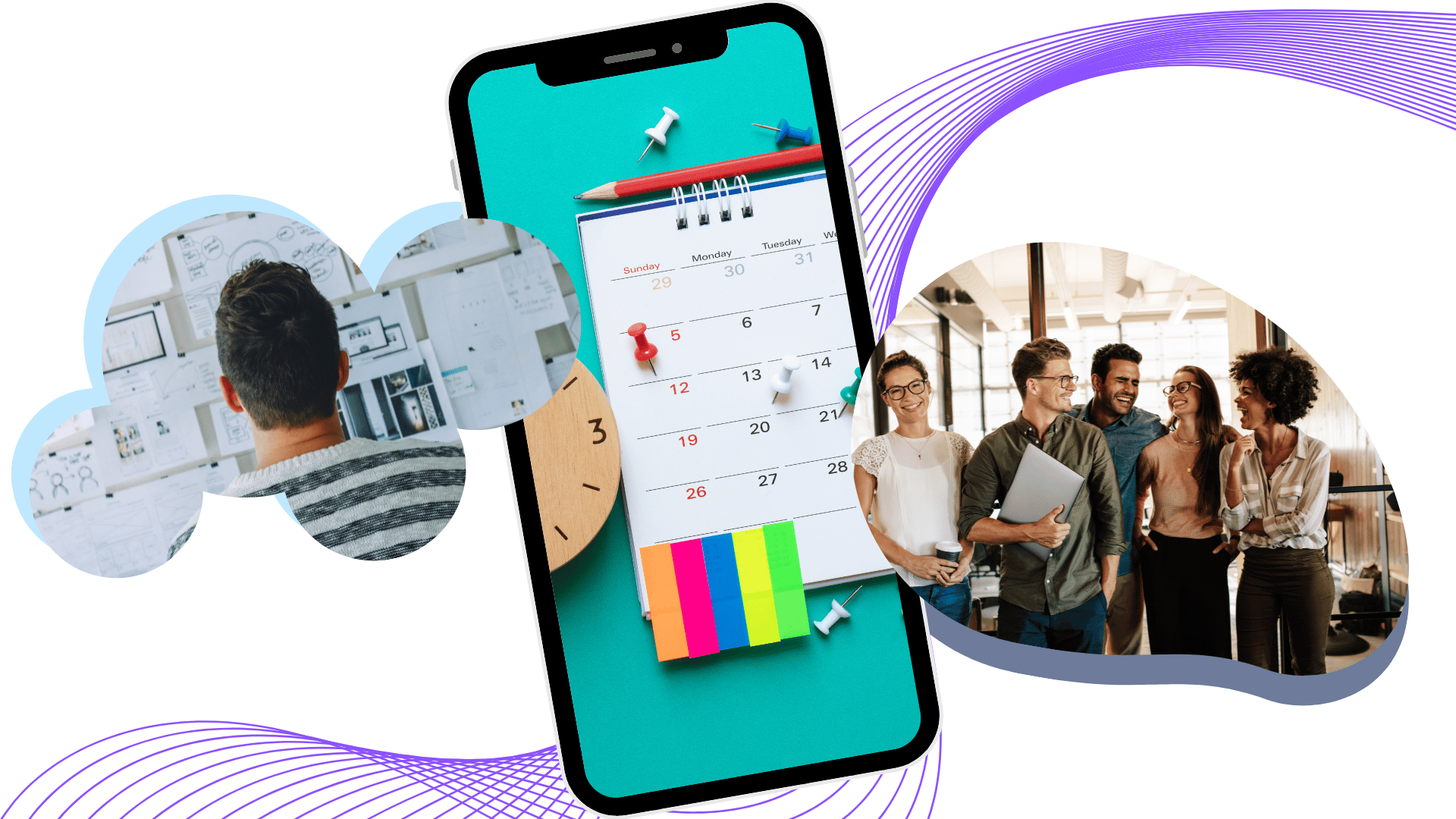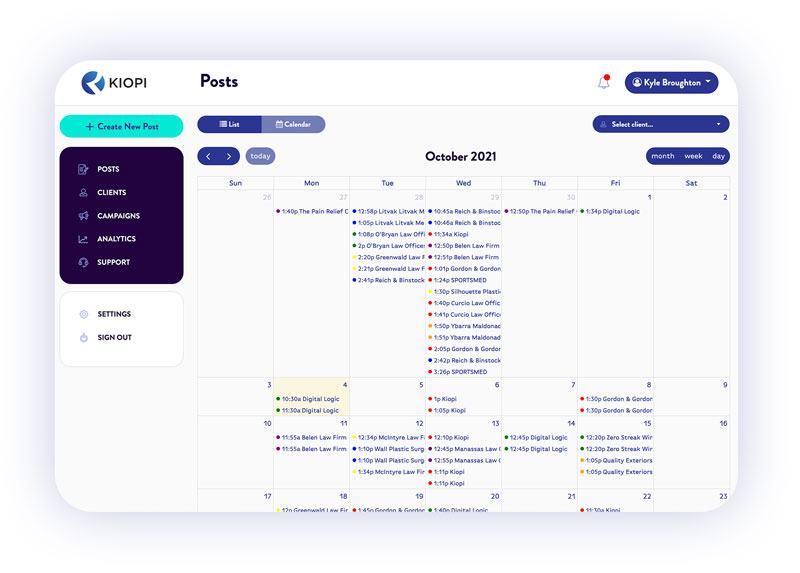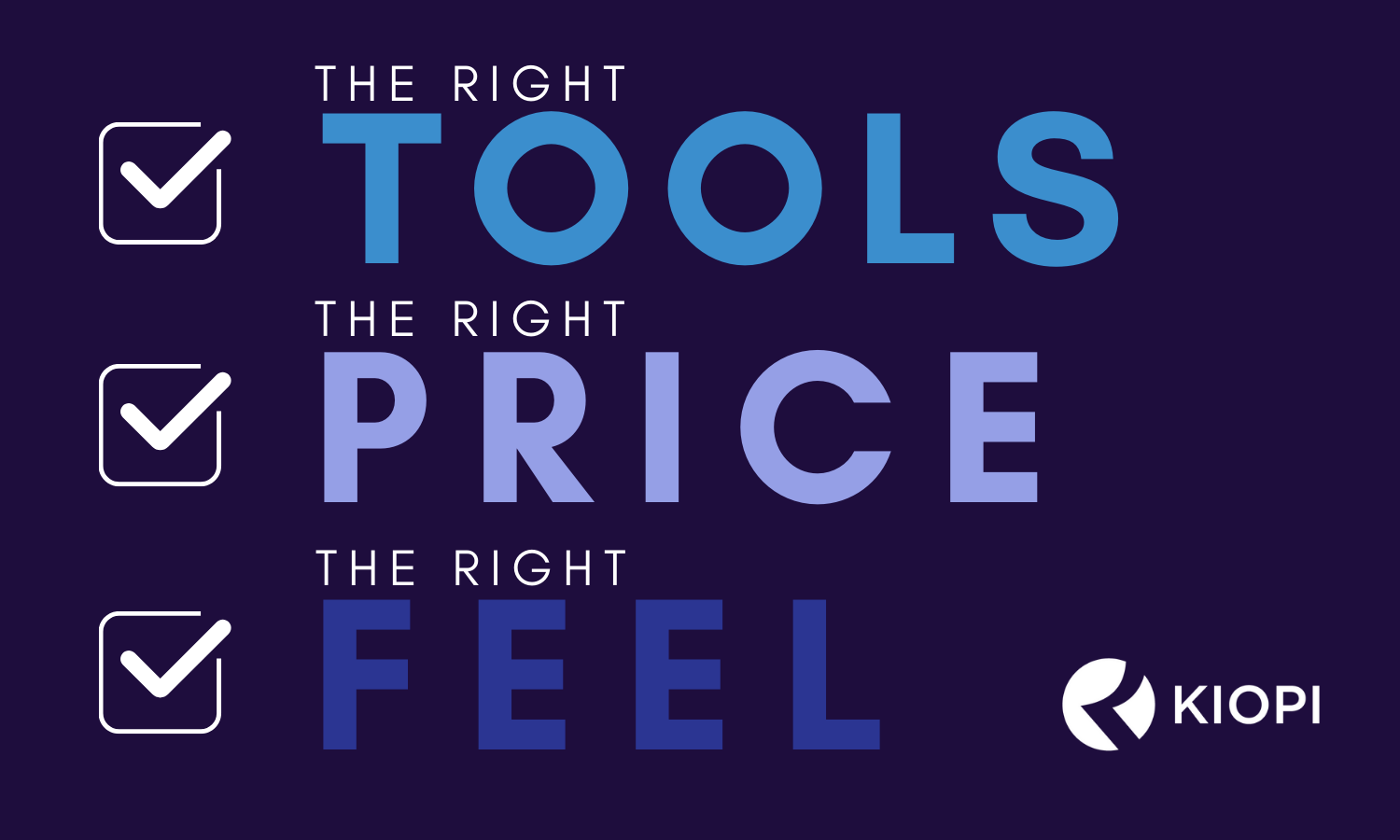Marketing Planner
lauryn preston
Table of Contents
One of the most essential parts of any marketing campaign is the marketing plan. Marketing planning can help a business understand its marketing goals and develop the steps they need to take to achieve its vision. When developing a marketing plan, however, marketers need to have their ideas, research, resources, templates, projects, and planned content all in one accessible place. That’s where a social media marketing planner comes in.
An effective marketing planner can ensure every member of the marketing team understands their role for marketing projects. It can also show progress of relevant progress to each campaign.
Marketing planners come in many different formats, including physical and digital, but many businesses opt to use digital marketing planners, like Kiopi.
Kiopi is a digital campaign management software designed to be an all-in-one marketing planner for business owners and marketing professionals. With Kiopi’s social media posting services, you can develop and schedule posts for Facebook, Instagram, Twitter, GMB, and LinkedIn, ensuring your marketing strategy reaches prospective customers on the most popular and even new social platforms on the internet today.
Interested in learning more? Kiopi offers new users a 14-day free trial, so visit our website and get started with Kiopi today!
What is a Marketing Planner?

A marketing planner can either be a person from your organization who is in charge of developing and managing the business’s marketing plan or a tool that helps the marketing professional at large understand the marketing plan and create content according to the plan.
In this article, we’ll be talking about what a social media marketing planner can do for you and your business when managing your marketing campaigns.
Marketing plans help business owners and marketing pros identify areas of opportunity and create strategies with their goals in mind. They may organize these opportunities through data analysis of their target audience, their competitors, or their own brand’s past marketing efforts. Managers should know the effect of social media on business for their business specifically.
Whether a business is looking to increase sales, brand awareness, industry share, or audience engagement, a marketing planner can help.
The marketing planner will then host the marketing plan in an easily-accessible location so that all members of the marketing group can determine how they are going to reach their goals using their skills and various resources.
Again, this can include a physical, in-person planner using a whiteboard or sticky notes for organizing and writing scheduled content. Or it can be an online marketing planner like a digital calendar or collaborative spreadsheet. It can include plans and ideas for traditional advertising campaigns, digital advertising campaigns, social media campaigns, email marketing campaigns, templates, research, writing samples, and more.
Learn more about the elements of a social media campaign.
How to Organize Your Marketing Efforts With Marketing Planners
There are many ways for you and your team to use a marketing planner to your advantage, but your marketing planner depends largely on your marketing plan.
Below are some tips on how you can develop effective marketing plans so you can effectively utilize marketing planners to generate cohesive, growth-oriented content.

Outline Goals for Your Marketing Campaigns
One of the first things you should do when developing your marketing plan is outline the overarching marketing goals for your company or organization. These will largely depend on what your business wants from your digital marketing efforts.
After all, you cant determine or create effective growth strategies without identifying areas in which your business needs to grow.
For example, if your company has a new product or service that potential customers may not be familiar with, your marketing efforts may be focused on market development rather than increased market share. Since your organization is providing the industry with something new, you likely don’t have a lot of competition, meaning you already have a high market share.
In another example, you may have an organization that offers a product or service that already exists, so your marketing goals may be focused on market penetration. It can be difficult to increase sales if your product or service can be found through other, more easily-recognizable brands or companies.
Depending on what you and your business need, you can develop strategies with those goals in mind.
All it takes is a little bit of planning, a few creative ideas, marketers with certain skills (like writing), and a marketing planner to gain success using this tactic.
Define Your Company's Target Audience
After you develop the goals that your marketing efforts need to meet, you can create and analyze your company’s target audience.
When developing a target audience for your company or business, it’s important to understand what needs and/or wants that your products or services fulfill. From there, you can determine what kind of customer will be interested in your products or services and will be willing to spend money on it.
Once you determine who your target audience is, then you can work to understand them.
They’re the people who will help you reach your goals, so their interests, habits, ideas, and opinions should be central to your marketing plan. Study your target demographic’s consumer behaviors, identify marketing trends that will connect with them, and engage in social listening to better understand the ways they engage with content.
Social listening tools can help in planning, creating, and determining the best practices for your organization moving forward.
Choose Digital Marketing Strategy
Alright, now that you’ve developed goals for your business and identified your target demographic, you can begin formulating a plan to achieve those goals and reach those consumers right where they are.
One of the first steps in developing your marketing plan is to decide which communication channels you want to focus on.
You have to get your message out to your audience, so understanding what media channels they use and what marketing trends resonate with them is crucial. These can include things like traditional advertising, email marketing, digital advertising, social media marketing, and even affiliate or influencer marketing.
Set a Digital Advertising Budget
When developing your marketing strategy, you’ll need to develop a budget. Financial planning is at the center of all business endeavors, and marketing projects are no exception. While some people don’t mind spending money, it’s wise to have a budget before moving your data to the marketing planner you choose!
Find out what your business is willing to spend on advertising and allocate funds to various communication channels. Your marketing strategy will help you prioritize channels that will reach your marketing goals and reach your target audience.
We provide cost comparisons for the following tools below:
Use a Marketing Planner
Finally, you can utilize a marketing planner to help you and your marketing team develop a schedule for your marketing strategy, creating ideas, planning out content, etc. After some time, you can use the marketing planner to identify places in which you could be focusing more of your attention.
Your marketing planner can help ensure content is developed, reviewed, and approved well in advance to limit confusion and stress. Additionally, marketing planners help ensure your entire team has an idea of the plan as a whole rather than just what their skills will add to the plan.
A marketing planner can come in many shapes and sizes, so it’s up to you and your team to find one that works for you.
While some companies use an office wall or whiteboard to develop and display their marketing plan, many businesses use online marketing planners, which often already have set structures or templates, allowing them to simply fill in the blanks with their proposed plan.
Something like a social content calendar or social media scheduling tool can help you plan out when and where your team should be focusing your marketing efforts to ensure business success.
This is just one of the many social media benefits for businesses.
Create a Content Calendar
A content calendar is exactly what it sounds like–a calendar of content inside the marketing planner.
It allows you and your team to see what you have planned out in terms of content. This can include website content, social content, and more. Content calendars can be physical, like on a whiteboard, but oftentimes they’re digital, allowing team members to view and edit content or templates in real-time, right on their computer screen.
If you’re looking for a way to develop, organize, and schedule social media content for your brand or business, Kiopi has you covered.
Our digital content calendar inside the marketing planner can help you track what’s been posted, as well as plan what you want to post in coordination with your team. It can also help ensure you are posting on a regular basis so that you can keep your audience engaged with you and your content.
Track Results
Once you’ve deployed your marketing plan, it’s time to go back and analyze the results, as social media measuring is important, as well!
You can study how well your marketing strategies worked to achieve your goals by analyzing click-through rates, social media interactions, webpage visits, sales, and leads generated from your campaign or campaigns via Kiopi’s marketing planner.
These marketing results can help you fine-tune future marketing strategies so that you can better achieve your goals.
Learn more about how to monitor social media traffic.
Leverage Online Marketing Tools Like Kiopi
Marketing plans aren’t easy to develop, and marketing planners are hard to make from scratch.
It takes a lot of time and effort to decide on how to best organize your marketing plan and communicate it to your entire team. Luckily for social content creators, Kiopi’s content management tools inside the marketing planner can help you develop your social marketing plan, organize your planned marketing activities, and schedule out your posts in advance with our social planning tool!
Users can also take advantage of Kiopi’s new AI social posting generator and see all the benefits of social media automation at its finest!

How Social Media Marketing Tools Can Help You Become a Better Digital Marketing Manager
Whether you have a social media marketing plan in place or you’re starting from scratch, Kiopi’s marketing planner for small business owners and marketing pros is here to help you every step of the way.
When developing your plan and identifying your target audience, take advantage of our social media analytics tools. These tools inside the marketing planner can help you identify market trends and analyze consumer behavior so that you can develop strategic and meaningful content that will resonate with your customer base.
In addition to helping you develop a strategic plan with your marketing goals in mind, our marketing planner can also help you identify when you want to post to your various social channels. Consistency is key when it comes to posting on social platforms and remembering to post can be difficult.
Kiopi’s marketing planner does the work for you by allowing you to schedule out your posts and ideas ahead of time and have them automatically post to your account or accounts when you want them to.
Your marketing planner should be accessible and easy to use so that every member of your team is on the same page. Kiopi’s content calendar is designed to help you and your team see when you plan to post to social media, what content you plan to make, and how that content fits into the bigger picture. This is huge for time management purposes.
After the marketing plan is complete, Kiopi’s analytics tools allow you to see how well your social media posts performed. These insights can be crucial when developing your next marketing plan and can help you identify new opportunities that you can use to meet your goals.
Ready to Start Your 14-Day Trial?
Social media is an incredibly powerful tool for businesses of all kinds, so incorporating social media into your marketing plan is a great way to ensure you’re reaching your audience right where they are. Whether you’re an online business or an in-person establishment, Kiopi’s marketing planner tools can help you identify and understand your target demographic, reach them on social media, and develop content that will engage them.
Ready to get started? Sign up and start your 14-day free trial today!
